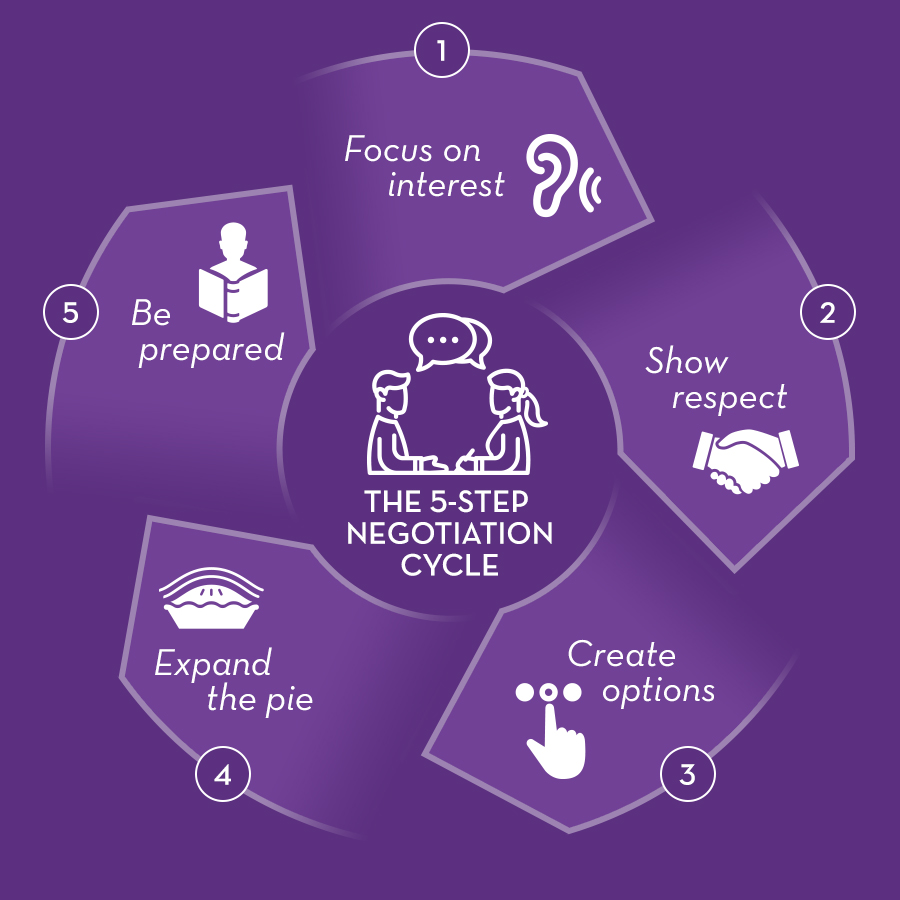Whether you’re negotiating a multi-million dollar business deal, negotiating with the vehicle in the other lane to let you over, or negotiating with your six-year-old to put on his pants, negotiation is a fact of life.
April 21, 2017
Whether you’re negotiating a multi-million dollar business deal, negotiating with the vehicle in the other lane to let you over, or negotiating with your six-year-old to put on his pants, negotiation is a fact of life.
That’s how Dr. Rita Kosnik, Executive MBA professor of negotiations – seven-time faculty member of the year – opened her presentation at the April preview luncheon in the gorgeous Las Colinas Country Club.
Dr. Kosnik talked a bit about how her course provides both the tools to negotiate and the opportunity to experiment with those tools in a risk-free environment – to try, fail and ultimately perfect your negotiation skills before you start using them in the real world.
The real world is a major theme in the program – every course points back to how you can use it outside the classroom. This preview luncheon was no different. Dr. Kosnik announced she was going to help us conduct a major negotiation that was coming up for us all soon:
Negotiating with your family and employer to support you in entering the Executive MBA program.
It’s a tough one: You’re going to be out doing the fun part while your family’s stuck at home with the chores and your boss is stuck at work with one less person every other Friday. How do you negotiate yourself out of that one? First: the don’ts.

How NOT to Negotiate
Dr. Kosnik started by outlining methods you shouldn’t use in negotiations.
- Feeling entitled. Saying things like “You owe it to me,” and “It’s my turn.” This results in a head-to-head battle, which means in the end, someone is going to lose – and they’re going to want revenge.
- Overestimating your value. Thinking they’ll never be able to replace you, or reminding them “I’ve been here the longest.” The longer we do something, more we overvalue it, like when you’re trying to sell your house and you put tons of work into updating it. A potential buyer won’t see all that sweat or all those memories; they just see an overpriced house.
“This program is not a reward for the past, but an investment in the future.”
- Dr. Kosnik
- Assuming the best (or worst). Assuming is of course the “a” word: Assuming the other party to be tough, so you go in like a bull in a china shop. Or assuming they’re pushovers and getting shot down. Don’t assume your employer or spouse thinks either “great” or “never;” practice what you’ll say in several different scenarios ahead of time.
- Complaining. “I’ve sacrificed so much for this company (or the family).” You might create some guilt on the other side, but a small gift is enough to assuage small amount of guilt, the same way $1 is enough to assuage guilt when you pass the Salvation Army bucket during the holidays. You might get an opportunity to work on a cool project, or an extra day off. Not an 18-month MBA program.
- Ultimatums. Threatening to leave if they don’t immediately support your dream? Do you really want to test it? Be careful with threats; they can backfire.
The Successful Negotiation Formula
We think about specific formal bargaining sessions when we think of negotiations. But these are usually intense, stressful and win-or-lose. Most people don’t associate negotiation with fun, opportunity and collaboration. But negotiating does not equal bargaining. It’s more like a puzzle to solve. Here’s the formula:
Success = Value + Relationship
In other words:
- Create value for all parties (so we are all better off in the end)
- Strengthen relationships (which improves your reputation)

Dr. Kosnik takes the first step as an example: Focus on Interest – not just on their position or what they say they want. Dig deeper to find their core needs.
“Negotiation starts with being a great detective,” Dr. Kosnik says. “We work hard on listening.”
To illustrate, Dr. Kosnik related a personal situation she’s in now: Deciding on a family vacation.
Her son wants to go to Hawaii. Her husband wants to rent a cabin in Big Bend. She wants to go on a cruise.
“How do we choose?” she asks us.
We discuss whose wishes carry more weight, we vote on which we’d choose, and one guy in the back says “It’s simple; two men, one woman. Happy wife, happy life!”
“You just passed my class!” Dr. Kosnik jokes. Of course, she adds, then she’ll have two mopey men along on her dream vacation.
“Why do you want to go on the cruise?” someone asks.
We see by Dr. Kosnik’s reaction that this is the right question. She explains the draw: You don’t have to do anything on a cruise. No planning, no cooking; it’s totally mindless.
We move on to the cabin. Her husband wants something cheap – they’re remodeling their house right now. And he wants a place where he can disconnect – there’s no Wi-Fi out there.
And as it turns out, their son wasn’t interested in Hawaii for the beaches, but for the bragging rights from the exotic locale – and for the nature in general.
From there, we started coming up with alternatives that encompassed all these things, settling on “some kind of all-inclusive wilderness resort.” We didn’t fall too far from the truth; Dr. Kosnik explained they were considering a resort in Costa Rica. Effortless, remote, exotic and – thanks to all the miles the Kosniks have built up with Southwest Airlines – affordable.
“Don’t accept blindly what the other side tells you they want;” Dr. Kosnik sums up, “Ask WHY.”
Negotiating Support for the Executive MBA Program
So how do you use these tools to convince your family and employer to support your entering the program?
- Focus on interest. Find out what their real concerns are. One spouse’s main concern was that they would never see each other. They made a deal to go out for fun at least once per week. Another was concerned about the kids – they have three, one of whom is disabled and requires constant attention. They arranged for the EMBA student to sit with the disabled child on Sundays while doing homework; it gave them time together while his wife and the other kids could go off and do things they normally couldn’t.
- Show Respect. Educate them on the details without being patronizing. Be transparent about when you’ll be gone, how much homework you’ll have, etc.
- Create options. Make the other side shine by emphasizing things they could gain: Show them how your education will pay off for the whole family, for the company. Give specific examples of how it could help with upcoming projects and family goals.
- Expand the pie. What else can you offer? More than time or money – maybe potential referrals through your new network of classmates, or illustrating to your kids the importance of education.
- Be prepared. Think long term.If you just try to win, you can lose the relationship; invest in the relationship instead by doing your research, by really listening and understanding the other person’s needs. That, in turn, cycles back to focusing on their interests.
That’s it in a nutshell, and the beauty is, it works in every setting. And as Dr. Kosnik adds, “We have a ball in class.”
Is the Neeley EMBA program right for you? Find out.

